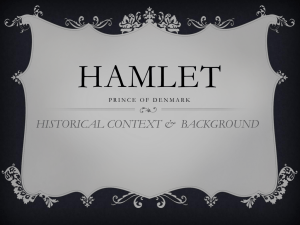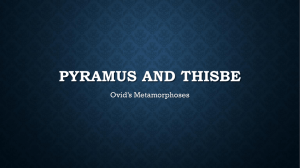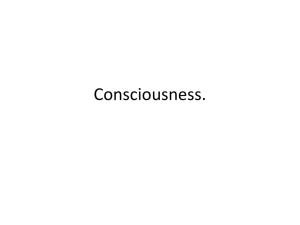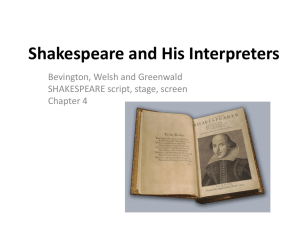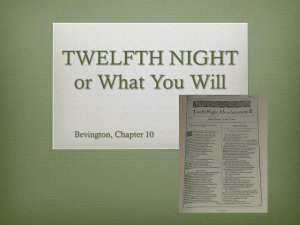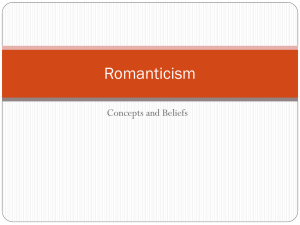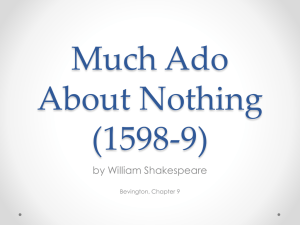Coleridge 7 HW - Heward Wilkinson, London Psychotherapist
advertisement
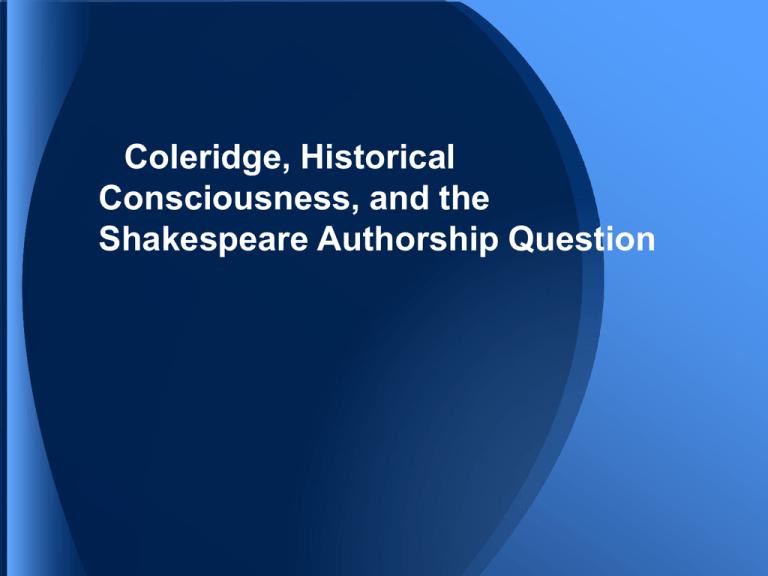
Coleridge, Historical Consciousness, and the Shakespeare Authorship Question Coleridge, Historical Consciousness, and the Shakespeare Authorship Question The level of mind of an author cannot be less complex than that of his/her creations A philosophical argument about Authorship for commonsense and sceptical people. Coleridge, Historical Consciousness, and the Shakespeare Authorship Question Changes in consciousness must be discernable in the texts Shakespeare, especially Hamlet, represents a new kind of consciousness. This new consciousness must be manifest in the life of the author. Consciouness of Historicality Vico, Coleridge, Illustrations from TS Eliot, CS Lewis • Coleridge, after Vico’s amazing pioneering, embodies the new and later form of historical consciousness - consciousness of historicality • This new form of consciousness makes it possible to recognise the evolution of consciousness that takes place in Shakespeare • Shapiro, accusing Malone of anachronism, has no inkling that these two are different SHAPIRO Both with regard to Samuel Schmucker http://shake-speares-bible.com/2011/10/31/guest-postby-dr-heward-wilkinson-the-significance-of-thelongevity-of-the-shakespeare-authorship-question/ and Malone, Shapiro, as an argument of convenience, repudiates the whole trend of modern Higher Critical thought and methodology. SHAPIRO Shapiro on Ireland and Malone with his usual malice (pp. 52-53) ‘Malone, much like the scholars who tell his story, spent much of his life surrounded by old books and manuscripts, strained his vision poring over documents in archives, and struggled to complete his life work on Shakespeare. Ireland cheated, took a short cut. But in truth they were in pursuit of the same goal – which may account for the viciousness of his attack on his young rival. SHAPIRO Shapiro on Ireland and Malone with his usual malice (pp. 52-53) ‘Both were committed to rewriting Shakespeare’s life; one forged documents, the other forged connections between the life and the works. In retrospect, the damage done by Malone was far greater and long lasting. He was the first Shakespearean to believe that his hard-earned expertise gave him the right, which he and many scholars have since tried to deny to others, to search Shakespeare’s plays for clues to his personal life.’ [my emphasis] SHAPIRO Whereas, George Steevens, Malone’s opponent, like Schmucker, is quoted with total approval and emphasis by Shapiro (p. 47) ‘As all that is known with any degree of certainty concerning Shakespeare is – that he was born at Stratford upon Avon – married and had children there – went to London, where he commenced actor, and wrote poems and plays – returned to Stratford, made his will, died, and was buried – I must confess my readiness to combat every unfounded supposition respecting the particular occurrences of his life.’ SHAPIRO Shapiro approves of Steevens’ Berlin Wall against biographical interpretation. None of this, of course, would arise or have arisen at all, were there not an authorship problem. Shapiro’s position is a tacit and emphatic confession of Bankruptcy. T S Eliot’s recognition The man or woman of genius creates sensibility and bequeaths the outcome of that creating. 'Sensibility alters from generation to generation in everybody, whether we will or no; but expression is only altered by a man of genius. ' We are presupposing Sensibility/Consciousness is realigned in expression In Shakespeare supremely • Eliot, like CS Lewis discussing Courtly Love - ‘Compared with this revolution the Renaissance is a mere ripple on the surface of literature.’ is presupposing that we can determine the character of the sensibility and consciousness an author inhabits where they succeed in expressing it in poetry. • This is supremely true of Shakespearean language, first critically appreciated by Coleridge. We presuppose Sensibility/Consciousness is realised in expression In Shakespeare supremely • Dramatic Consciousness, or imagination, in Shakespeare, for Coleridge appertains to the particular conception of the poetic mind as a dramatic plurality, and mirroring creation, which is the characteristic of Shakespearean and early 17th Century verse, especially Donne and Marvell. Illustrated by the exquisite "The swan's down-feather" passage /Antony and Cleopatra Antony The April’s in her eyes: it is love’s spring, And these the showers to bring it on. Be cheerful. Octavia Sir, look well to my husband’s house: and – Caesar Octavia? Octavia I’ll tell you in your ear. Antony Her tongue will not obey her heart, nor can Her heart inform her tongue – the swan’s down-feather That stands upon the swell at full of tide, And neither way inclines. "The swan's down-feather" passage FR Leavis comments: The Arden Shakespeare footnote, which regards Antony’s last utterance, runs: It is not clear whether Octavia’s heart is the swan’s down-feather, swayed neither way on the full tide of emotion at parting with her brother to accompany her husband, or whether it is the inaction of heart and tongue, on the same occasion, which is elliptically compared to that of the ` feather. "The swan's down-feather" passage FR Leavis comments: ‘It is not clear’ – it ought to be clear; that is the implication. The implied Criterion, ‘clarity’, entails an ‘either/or’; does the image mean this or that? The reductive absurdity of the conception of language behind the criterion thus brought up is surely plain. It wouldn’t be enough to say the image has both meanings: no one really reading Shakespeare would ask to which it is, or to what, that ‘the swan’s downfeather’ is meant to applymetaphorically, because it would be so plain that the relevant meaning – the communication in which the the image plays its part – is created by the utterance as a totality, and is not a matter of separate local meanings put together more or less felicitously. "The swan's down-feather" Through reading we enter deeply into what Husserl calls the total "life-world" of another - for us an historically informed life-world. Leavis, in an argument that presupposes historicality, argues that ‘Shakespeare’ would not have been possible in a world where Cartesian ‘clarity of ideas’ had already triumphed Shakespeare does not articulate historical consciousness as such but a new historical form of consciousness • • Historical consciousness as such makes it newly possible to recognize the new consciousness which there was in Shakespeare. Shapiro does not grasp the relationship between these Only after the rise of historical consciousness can the question of the Historical Jesus come into its own, as also does the Shakespeare Authorship Question in the 1830s Sketch of the evolution of consciousness: consciousness - and meta-consciousness of history I. Modern personal reflexive consciousness emerging at the time of the Renaissance. Hamlet. Bloom ‘the Invention of the Human’ The problem of history is not articulated as such. It remains implicit, - as the tension between ‘mediaeval’ and ‘modern’ II. The emergence of explicit awareness of historical consciousness as such in Vico (1720ff) and then his Romantic period successors. We may call this reflexive theorised consciousness of historicity as such Sketch of the evolution of consciousness 2 III. This runs alongside, and emerges hesitantly from, and in contrast to, Enlightenment actualised as a secular form of the sacred and as a belief framework, and hence initially a-historically, from roughly 1660-1780 IV. Romantic transformation of consciousness, includes full emergence of historical consciousness as such. Romanticism actualised as a form of sacred consciousness, identified with the creative human mind as such, apprehended historically. Coleridge supreme articulator of this new consciousness. Shapiro’s fetish, thinks it the only key change. Approx 1790-1830 (Boswell ‘Johnson’ 1791, Lyrical Ballads 1798) Sketch of the Evolution of Consciousness 3 V. And hence there follows a profound change of consciousness at the beginning of the scientifictechnological era. Reform Act 1832. PostNapoleonic War period. This is the point from which Nietzsche's ‘Death of God’ as an analysis of the de-sacralisation of the modern world becomes applicable. The Shakespeare Authorship question, along with the question of the Historical Jesus (DF Strauss), comes into view. At this point scientific functional-historical enquiry is instituted. Benthamism rampant. Tractarianism as Reaction. Enter - belatedly - Shapiro and his ilk Sketch of the Evolution of Consciousness 5 VI. Nevertheles, now a retrieval of the modern consciousness, which was roughly speaking, first articulated in Hamlet and in John Donne, becomes possible (TS Eliot’s ‘Dissociation of Sensibility’) It is not by accident that Hamlet now becomes the paradigm, for Goethe, for the Schlegels, for Coleridge, for Hazlitt and Keats, for Nietzsche, for Freud, James Joyce, DH Lawrence, TS Eliot, Wilson Knight, FR Leavis, Harold Bloom - and for we Oxfordians. Coleridge's Breakthrough • The uncanny multidetermination of meaning and decision-making is, as Coleridge very nearly saw, the root and source of Hamlet's inability to solve his problem. He IS Modern Man (Valery) - before his time! • The Ghost is precisely the haunting death of mediaeval/Catholic feudal (and pre-feudal, pagan, c.f., Gontar) England, which cannot be encompassed and resolved by the Lutheran or Calvinistic Reformation. Coleridge's Breakthrough • Hamlet is the advance guard of consciousness. For Shakespeare, it is surely implicit in the terrible death and oblivion Sonnets (e.g., LXXILXXIV, echoing Macbeth and Hamlet) • The intolerable tension between feudal, prefeudal man, and modern man, almost tears him apart before our eyes.He strives to create an alchemical connection between the feudal prebourgeois and modern consciousness • The 'family dimension', whatever ones view (c.f., Gontar again) of that, is not the whole meaning Coleridge's Breakthrough • In Shakespeare's work there is never a simple one to one relationship between author and works • Coleridge, in philosophical, historical, and literary ability, is the greatest English critical mind. • He also- with all due respect to Dr. Johnsoninaugurates English Shakespeare Criticism for the modern era Reflexive Infinite Authorial Consciousness in Shakespeare and then Coleridge. • What, however, is new and newly clear in Coleridge is his profound recognition of the author/creator of Hamlet, Falstaff, and Richard II, as one who embodies his own consciousness of authorship, and authorial reflection, in the plays • To him a widened conception of authorobiographical motivation, - as expressed, for instance, in Joseph Conrad's Decoud, - in Nostromo, is to be attributed. Reflexive Infinite Authorial Consciousness in Shakespeare and then Coleridge. • The profound expression of the priority of dramatic imagination, in Coleridge and Keats, we find recurring latterly in degenerate form in the doctrines of "art for arts sake", and in philistine utilitarian convenience mode in Shapiro's Contested Will. • Coleridge has a positive authoro-biographical conception of "infinite consciousness', not an empty and abstract generic consciousness, as it becomes in Shapiro. Reflexive Infinite Authorial Consciousness in Shakespeare and then Coleridge. The ‘Mercutio’ Character “Shakespeare’s characters might be reduced to a few, that is to say to a few classes of characters. If you took his gentlemen, for instance; the character of Biron was seen again in Mercutio, in Benedick, and a variety of others. They were men who combined the politeness of the Courtier with the faculties of intellect; the powers of combination which only belong to an intellectual mind. The wonder was how he should thus disguise himself, and have such miraculous powers of conveying the Poet, without even raising in ourselves the consciousness of him.….” Reflexive Infinite Authorial Consciousness in Shakespeare and then Coleridge. The ‘Mercutio’ Character “In the address of Mercutio to Romeo regarding the Fairy Queen Mab….there would be noticed all the fancy of the poet, but the language in which was contained possessed such a facility that one would say, almost, that it was impossible for it to be thought, unless it were thought as naturally and without effect as Mercutio represented it. This was the great art by which Shakespeare combined the Poet and the gentleman, throughout borrowing from his own most amiable character that which could only combine them, a perfect simplicity of mind, a delight in what was excellent for its own sake, without reference to himself as causing it….” Reflexive Infinite Authorial Consciousness in Shakespeare and then Coleridge. Hamlet then Macbeth ‘Tis now the very witching time of night, When churchyards yawn and hell itself breathes out Contagion to this world: now could I drink hot blood, And do such bitter business as the day Would quake to look on……’ etc., “The utmost Hamlet arrives at is a disposition, a mood, to do something. What is left undecided, while every word he utters tends to betray his disguise. The perfect equal of any call of the moment is Hamlet, let it only not be for a future.” Coleridge recognises the Shakespeare hero cannot deal with the future. He has to be vaulted into it. (c.f., Macbeth I.sc.7, Macbeth on time but also the Hecate speech, III.sc.2). As Ogburn argues, Macbeth is a Hamlet who acts! But is no more decisive, - in the sense of centred, - for all that. Reflexive Infinite Authorial Consciousness in Shakespeare and then Coleridge. Hamlet C’s comment on: ‘How all occasions do inform against me….’etc. “Yet with all this sense of duty, this resolution arising out of conviction, nothing is done; this admirable and consistent character, deeply acquainted with his own feelings, painting them with such wonderful power and accuracy, and just as strongly convinced of the fitness of executing the solemn charge committed to him, still yields to the same retiring from all reality, which is the result of having what we express by the term, ‘a world within himself’: Such a mind as this is near akin to madness, Dryden has said. Great wit to madness nearly is allied… and he was right; for he means by wit that greatness of genius, which led Hamlet to the perfect knowledge of his own character, which with all strength of motive was so weak as to be unable to carry into effect his most obvious duty.” Reflexive Infinite Authorial Consciousness in Shakespeare and then Coleridge. • Coleridge's identification with Hamlet is an identification with Hamlet's profoundly dramatiform process-based consciousness, and his multiple awareness • Coleridge embodied this in his own profoundly multiplex, polymathic, mercurial, neo-platonic, and visionary fashion. Reflexive Infinite Authorial Consciousness in Shakespeare and then Coleridge. • Both Coleridge and Keats, driven by the vacuity of relevant character in William of Stratford, fill in the biographical gaps, though with moments of puzzlement, from their own vision and character. • They likewise develop variants on the "chameleon poet" conception, to escape from the vacuum offered by the Stratford narrative. Reflexive Infinite Authorial Consciousness in Shakespeare and then Coleridge. • But for ever after Coleridge and Keats, its no longer possible to consider as anachronism, with the expectation of finding it in his life, the attribution of "infinite consciousness" to Shakespeare. • In the light of Coleridge's vast consciousness and span of awareness, we have to recognize Shakespeare's own, even greater, giant mind. Such a mind, as with Coleridge, the mind that created Falstaff, Prospero, and Hamlet,- as Coleridge created the Ancient Mariner. Reflexive Infinite Authorial Consciousness in Shakespeare and then Coleridge. (something quite impossible for the taciturn business operative from Stratford) And thus we restore the Homeric mercuriality and divine force Coleridge, Whitman, and Wilson Knight saw in the plays! We must recognize the reality of the new consciousness realised in the mercurial mind who created these mercurial plays and poems, Reflexive Infinite Authorial Consciousness in Shakespeare and then Coleridge. ‘Not the like discourser for Tongue, and head to be found out, Not the like resolute man for great and serious affairs, Not the like Lynx to spy out secrets and privities of States, Eyed like to Argus, eared like to Midas, nos'd like to Naso, Wing'd like to Mercury, fittst of a thousand for to be employ'd, This, nay more than this, doth practice of Italy in one year. None do I name, but some do I know, that a piece of a twelve month Hath so perfited outly and inly both body, both soul, That none for sense and senses half matchable with them. A vulture's smelling, Ape's tasting, sight of an eagle, A spider's touching, Hart's hearing, might of a Lion. Compounds of wisdom, wit, prowess, bounty, behavior, All gallant virtues, all qualities of body and soul.’ HEWARD WILKINSON THANK YOU! http://hewardwilkinson.co.uk http://www.karnacbooks.com/Product.asp?PID=2 5803 http://www.shakespearefellowship.org/briefchroni cles/briefchronicles-2b.pdf p. 139ff
